Toronto’s Eleven
I’ve only been coming here since ’98, but it seemed to me like the best Toronto Film Festival ever. Too many good films, too many I didn’t get to see, the energy always there…every day felt like a full deck.
I saw (or re-saw) eleven films here that I know will matter in terms of awards or box-office or causing some kind of a stir over the next thirteen and a half weeks, and that felt fairly bountiful.
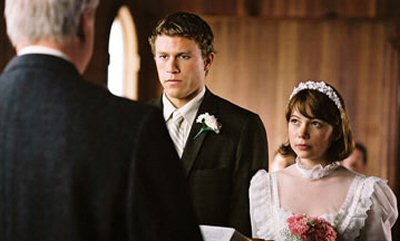
Brokeback Mountain costars Heath Ledger, Michelle Williams
I’m just sorry that the festival fathers didn’t re-show some of the favorites this past weekend (like they used to) so I could’ve seen some of the films that I couldn’t get to for whatever reason. Now I won’t get to see Bettie Page until next year…not good.
The goodies, in order of admiration…
< ?php include ('/home/hollyw9/public_html/wired'); ?>
1. Brokeback Mountain: I didn’t expect to be as moved as I was. Not a “gay cowboy” movie, but a film about the costs of love denied and lost. My idea of a profoundly sad film, and obviously a love story of a strikingly original cast… certainly in terms of multiplex movies. Oscar potential: A probable Best Picture candidate (if it doesn’t tank financially). Ditto Ang Lee for Best Director. Heath Ledger, who gives the best performance of his career here, will almost certainly snag a Best Actor nom. Commercial prospects: No telling, although I’d like to say quality sells itself and let it go at that. I know this movie is a kind of break- through, and therefore a marketing challenge as far as the cultural foot-draggers are concerned.
2. No Direction Home: Bob Dylan: An electrifying music-history saga, a powerful American epic and Martin Scorsese’s finest film since My Voyage in Italy. Oscar prospects: It’s not going out theatrically so Oscar doesn’t figure. Commercial potential: The numbers for the doc’s PBS airing on 9.26 and 9.27 should be huge; ditto the sales and rental for the DVD (in stores on Tuesday, 9.20).
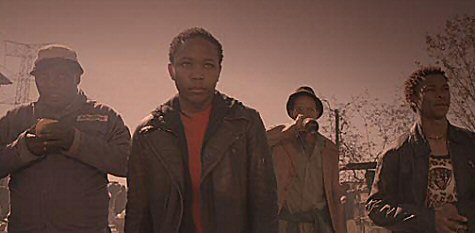
The Tsotsi gang
3. Capote: Searing, fascinating drama about a writer who pours his heart out and uses every ploy in the book to produce a groundbreaking novel, but loses his soul in the process. So deft and mature it’s almost like Louis Malle directed it. Oscar prospects: Phillip Seymour Hoffman’s performance as Truman Capote is an absolute lock for a Best Actor nomination, and I really think the film is good enough to be in the running for a Best Picture nomination. Clifton Collins, Jr. deserves a nom for Best Supporting Actor, Bennett Miller for Best Director, and Dan Futterman for Best Adapted Screenplay. Commercial potential: Everyone who’s ever heard the name “Truman Capote” is going to want to see Hoffman. One of those films that every semi-educated soul over the age of 25 or 26 is going to have to see…right?
4. Tsotsi: Emotionally pungent drama about the spiritual awakening of a socio- pathic teenage killer after he finds an infant boy in the back seat of a car he’s stolen. Winner of Toronto Film Festival’s audience award. Oscar prospects: A shoo-in for Best Foreign Language Film (it’s spoken in “Tsotsi-taal,” a mixture of several tongues), but obviously only if it gets picked up right away and pushed into theatres before 12.31. Commercial potential: A toughie…will depend very much on word-of-mouth, reviews, how good the marketing campaign is, etc.
5. A History of Violence: David Cronenberg’s strongest and most commercial film since The Fly. Oscar prospects: Limited, although William Hurt could push through with a Best Supporting Actor nomination. Commerical potential: On the modest side.
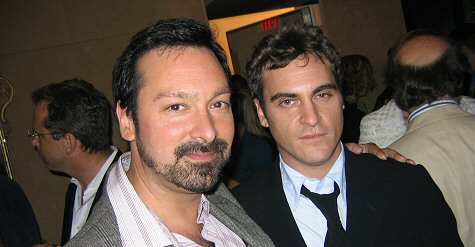
Walk the Line director James Mangold (l.), star Joaquin Pheonix
6. In Her Shoes: Best upscale chick flick since Terms of Endearment. Oscar prospects: Forget what Manohla Dargis or Stephanie Zacharek may or may not say about it — the fact that it emotionally connects means Shoes could go all the way and land noms for Best Picture, Best Director (Curtis Hanson), Best Screen- play, Best Actress (Toni Collette), etc. An assured Best Supporting Actress nom for Shirley MacLaine. Commercial potential: Very big, although Fox is going to have to work hard at first to sell it to the women who don’t read reviews, or who move their lips when they do.
7. Walk the Line: Admirably pared-down, ultra-believable Johnny Cash biopic…rooted and steady on its feet. Oscar prospects: Guaranteed Best Actor and Best Actress noms for Joaquin Pheonix and Reese Witherspoon; possible Best Picture and Best Director (James Mangold). Commercial potential: I don’t think it’s going to do what Ray did, but reasonably spirited business seems likely.
8. Thank You for Smoking: Sharp, clever, quippy…lacking in emotional gravitas. Oscar prospects: Not that kind of thing. Commercial potential: Good to pretty good.
9. Mrs. Henderson Presents: Not a massive home run but a very brisk serving of rudely effete British humor in a perky period vein. A lively near-perfect film for the over-30 (or do I really mean over-40?) crowd. Oscar prospects: A better-than- decent chance of Dame Judy Dench landing a Best Actress nomination…if the Weinstein Co. campaigns hard and smart for it. Commercial potential: Rather good.
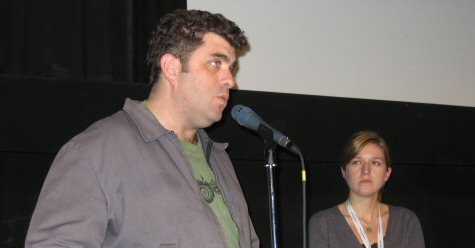
Why We Fight director Eugene Jarecki during q & a at Cumberland plex during Toronto Film Festival
10. Sketches of Frank Gehry: Sydney Pollack’s doc is a highly intelligent look at an exceptional man, and a profound contact high. Oscar prospects: There’s no theatrical distribution deal, and even if it lands one it may be too late (or so I understand) due to Academy rule about August deadline. Commercial potential: The only viewing opportunity for sure right now is a PBS “American Masters” airing in the fall of ’06.
11. Why We Fight: Eugene Jarecki’s doc about the carrot-and-stick relationship between American interventionism over the decades and the military-industrial complex is utterly fascinating, well-sculpted, and stirring. Oscar prospects: Good potential to figure among the Best Feature Doc nominees. Commercial potential : Good.
As for the rest…
The Modest but Very Welcome Return of Steven Soderbergh: Bubble
Good, Fairly Good, Decent: Mary (dir: Abel Ferrara), Cache (dir: Michael Haneke), Tristram Shandy (dir: Michael Winterbottom…although I’m leaning on the word of trusted sources, as I was shut out of the press screening last Monday), Everything is Illuminated (dir: Liev Schreiber), Imagine Me and You (dir: Ol Parker), L’enfer (dir: Davis Tanovic), Vers le Sud (dir: Laurent Cantet).
Shortfalls: North Country, Stoned, John & Jane, Romance & Cigarettes, Lie With Me.
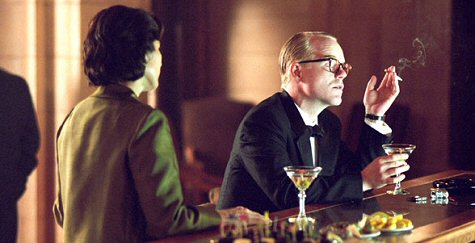
Capote costars Catherine Keener, Phillip Seymour Hoffman
Near-wipeout: Elizabethtown…but an obit would be premature at this stage, as a re-edit is in the works.
Wipeouts: Tideland, Revolver, Wassup Rockers, The Cabin Movie, Mrs. Harris.
If only the music grabbd me…: The Devil and Daniel Johnston.
Gloob gloob: Shopgirl, The President’s Last Bang, The White Masai, Mistress of Spices, Sorry Haters.
Martyr-Ball: The War Within, Paradise Now
Missed ‘Em: Leonard Cohen: I’m Your Man, Iberia, Tristram Shandy, The Matador, Edison, Jesus is Magic, The World’s Fastest Indian, The Proposition, The Notorious Bettie Page, Wah-Wah, Tim Burton’s The Corpse Bride (didn’t care that much about seeing this one), Oliver Twist, Bee Season.
Bad Guy and a Baby
Gavin Hood’s Tsotsi has become the big stand-out at the end of the Toronto Film Festival.
It was first shown on Wednesday night, right opposite the In Her Shoes viewing at Roy Thomson Hall, and by this time many of the top-tier journalists had left town, so there haven’t been a lot of insiders hopping up and down about it. And yet today — Saturday, 9.17 — it won the Toronto Film Festival People’s Choice award.
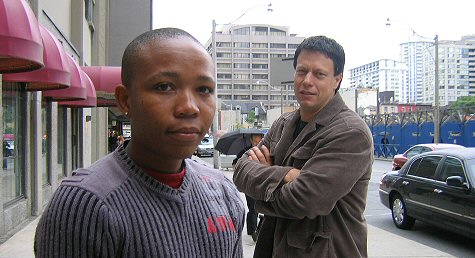
Tsotsi star Presley Chweneyagae (l.) and the film’s director-writer Gavin Hood outside Toronto’s Sutton Place hotel — Friday, 9.16, 8:55 am.
I also know Tsotsi has aroused the persistent passions of at least one would-be distributor. And that it touched enough people at the recently-wrapped Edinburgh Film Festival to win the Audience Award, along with the Michael Powell award for Best New British Feature.
Even the notoriously hard-nosed critic Len Klady told me early this afternoon, “I hear it’s very good.”
As I waited to see it Thursday afternoon I thought I might be in for another hyper- cut City of God crime-in-the-slums movie, but it was something quite different.
Set in a rancid Johannesburg shantytown, Tsotsi (pronounced “Sawt-see”) is about an ice-cold teenage thug (Presley Chweneyagae) who discovers a small spring of compassion in himself when he starts to care for an infant boy who happens to be in the back seat of a car he’s stolen.
What is this film doing exactly? It’s reminding audiences in a believably non-sappy way there are sparks of kindness in even the worst of us. It’s a rather Christian- minded movie, in a sense.
It may sound sentimental and manipulative, but it’s not. But neither is it sadistic or repellent in some flashy, gun-fetish way. It’s real and unblinking, but it also lets you feel what’s happening. But not too much…just enough.
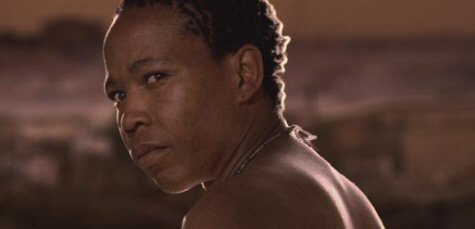
Tsotsi star Presley Chweneyagae
Emotions suppressed but leaking out anyway…the emotion you’d rather not feel but which won’t leave you the fuck alone…the emotions that you stopped letting in when you were eight or nine but have always been there…conveying these in a film is always a stronger, more poignant thing than having some emotionally healthy actor or actress cry their eyes out or hug everyone to death…please.
I said this in a Wired item posted on Friday morning, and here it is again: unlike Luc and Jean-Pierre Dardenne’s Palme d’Or-winning L’enfant, which it vaguely resembles, Tsotsi has a potential to snag some decent coin as well as Oscar nominations (Best Foreign-Language Film, Best Actor, etc.), critics awards, Golden Globe awards, etc.
How do I know Tsotsi will sell tickets? Because my good and kindly Toronto friend Leora Conway, who know what she knows but isn’t tremendously knowledgeable or sophisticated about movies, went apeshit after seeing Tsotsi at the Wednesday night premiere…she was beaming when she told me about it afterwards, and said it made her cry at the end.
Bad guys and wailing babies…it’s bound to be the very next phase. Tsotsi, L’enfant and Michael Davis’s Shoot ‘Em Up, the comically violent Don Murphy-New Line movie with Clive Owen as a gun-toting Man of Few Words protecting a baby who’s only a day or two old. Any others?
Wait a minute…I see a TV series in this. A wise-cracking yuppie assassin (think John Cusack) whose girlfriend dies just after giving birth..this hard-assed guy has to juggle diapers and nanny-care while taking care of business. And he’s got a nosey female neighbor who’s secretly hot for him.
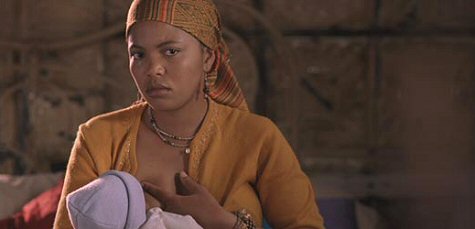
Tsotsi costar Terry Pheto as Miriam, a single mom who establishes a bond with Chweneyagae’s street thug.
I had breakfast early this morning with Hood, Tsotsi‘s director and writer (the film is based on a novel by South African playwright Athol Fugard), and Presley Chweneyagae, who plays the title role, at the Sutton Place hotel, and we batted it around some.
Hood said he’s always been “terrified” of sentimentality and “being mushy” in movies, and says that his mantra during shooting was that “there’s always got to be more going on within a character than what he lets out.”
Hood said he wanted to use formal compositions and a slower editing style than the one popularized by City of God “because I didn’t want to seem like I was saying ‘me too’…I didn’t want to come in second.”
Hood says he feels more of an affinity with the shooting style of director Walter Salles (The Motorcycle Diaries) and particularly Sales’ Central Station than he does with City of God director Fernando Meirelles.
The language that Chweneyagae and his costars speak is known as “Tsotsi-taal” (the first word meaning “thug” and the second meaning “language”). It’s a mixture of several tongues including English, Afrikaans, Zulu, Xhosa, Sothu and Tswana.
To qualify for Academy consideration, Tsotsi is opening in South Africa today for one week.
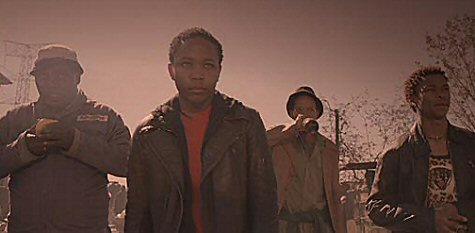
Tsotsi gang (l. to r.): Aap (Kenneth Nkosi), Tsotsi (Presley Chweneyagae), a failed teacher (Mothusi Magano) and Butcher (Zenzo Ngqobe)
Hood showed the finished film to Fugard, 87, at his San Diego home just before the Toronto Film Festival began. Fugard was delighted and wrote that Tsotsi “is everything in my wildest dreams that I hoped it would be…it is far and away the best film that has been made of something I have written [and] it will rank as one of the best films ever to come out of South Africa.
This is one of those “it” films. I could feel the rooted energy from the get-go…from Hood’s hard-edged direction, the elegant photography and Chweneyagae’s mesmerizing performance as an ice-cold psychopath who now and then devolves into a terrified three-year-old. It all coagulates into something steady and whole.
If I know anything about this business, somebody is going to pick this film up fairly soon. But they’ll need to move quickly once they do, so hubba-hubba and chop- chop.
Reasons to Believe
A thought hit me when I was writing my column from Toronto on the evening of 9.11.01, but I didn’t have the brass to write it down.
It was my suspicion that no one in the news media in the coming weeks or months would ever be permitted to explore (or even discuss on a talk show like, say, Chris Matthews’ “Hardball”) what might have motivated the 9.11 attackers to do what they did.
It seemed fairly obvious that the news media were already locked into characterizing the Al Qeada plotters as nothing more or less than harbingers of pure evil, and that allowing for the possibility that United States foreign policy might have had something to do with their anger would simply never be acknowledged.
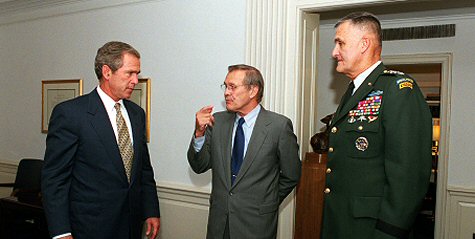
Not from Eugene Jarecki’s Why We Fight, although it could have been used if Jarecki had so chosen.
Eugene Jarecki’s Why We Fight, which I finally saw Thursday afternoon at Toronto’s Cumberland cineplex, isn’t the first doc to explore why so many people around the world hate our guts, but it’s one of the most precise and persuasive.
This is a cleanly composed, very perceptive explanation of how the American military-industrial complex basically runs everything and everyone, from the U.S. President to the U.S. Congress to the slant of our foreign policy.
Sony Pictures Classics will be releasing Jarecki’s doc in January 2006. It’s already been qualified, I’ve been told, to compete for the best feature-length documentary Oscar.
The news-clip centerpiece, as you might imagine, is former president Dwight D. Eisenhower’s farewell address warning about the influence of the burgeoning military-industrial complex. Jarecki then goes on to show exactly how prophetic Ike was.
This will seem like boilerpate stuff to some, but Jarecki and his sources explain how and why the U.S. decided at the end of World War II to become a permanent roving super-power with the technological ability (if not necessarily the political will) to strike any adversary in any country at any time.

Why We Fight director Eugene Jarecki during q & a following Thursday afternoon’s screening at the Cumberland plex — 9.15, 5:50 pm.
The film’s title is borrowed from a jingoistic Frank Capra doc made during World War II that explained the necessity of defeating Japan and Nazi Germany.
The movie says that for roughly the last 60 years, the U.S. has been led by a basic need for constant military adventurism for the sake of domestic corporate profits, which are then spread around to political supporters in government.
Fight shows how there are four branches of Eisenhower’s complex today — the military, the weapons-making industry, the U.S. Congress and conservative think tanks — and how they all feed into each other.
Gore Vidal is one of Fight‘s talking heads, supplying his view at one point that “we live in the United States of Amnesia.”
But Jarecki is smart enough to stay away from staunch liberals for the most part, speaking mostly to establishment or conservative types such as Sen. John McCain, high-level CIA veteran Chalmers Johnson, William Kristol, Richard Perle, former Lt. Gen. Karen Kwiatkowski and former president Eisenhower’s granddaughter Susan and son John.
Jarecki also talks to the wonderfully candid and articulate Charles Lewis of the Center for Public Integrity, who was more or less the star of Orwell Rolls in His Grave.

Former U.S. President Dwight D. Eisenhower delivering his farewell speech on 1.17.61.
Why We Fight is also effective when it talks to average-Joe types. The standout in this realm is an ex-cop named Wilton Sekzer, whose son was killed on 9.11 and who came to embrace a very cynical attitude about the foreign policy aims of the Bush administration, not to mention its general lack of candor about same.
Jarecki also interviews a fresh Army recruit named William Solomon, and to a couple of military pilots who dropped the first bombs in the 2003 invasion of Iraq.
On top of everything else, Jarecki is an excellent cinematographer and editor. The movie is persuasive in part because it’s been shot and cut with eye-pleasing expertise.
Eugene is the brother of Capturing the Freidmans director Andrew Jarecki, as well as the half-brother of Nic Jarecki, who made the excellent James Toback doc The Outsider. Having hung with all three, I can say with some authority they’re a clan worthy of Eugene O’Neill.
Lonesome Town
The energy is down all over the Toronto Film Festival. You can feel it on the street, at the Varsity, in the hotels…it’s over except for locals and stragglers like myself and a few clean-up screenings to get to, like tomorrow’s (9.16) showing of Martin Scorsese’s No Direction Home: Bob Dylan.
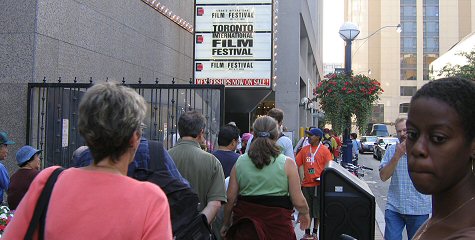
Girl Power
It was early Wednesday afternoon, and I was standing in the hallway of the 26th floor of Toronto’s Four Season’s hotel, waiting for my ten-minute quickie with In Her Shoes director Curtis Hanson.
And then a door opened about three feet away and Shoes costar Shirley Maclaine, who owns each and every scene she appears in, peeked out and said hello.
A Fox publicist sitting to MacLaine’s left smiled and nonchalantly said “hey.” I forget how Maclaine replied, but I think she was mainly looking to take a breather.

In Her Shoes star Toni Collette, snapped at Wednesday night’s post-gala party, has shed the weight she gained for the film and is now quite obviously not a brunette, as she is in the film. Director Curtis Hanson, Shirley MacLaine, Cameron Diaz and a bunch of journos (Peter Rainer among them), publicists and agents were also huddling in the VIP area.
The Fox publicist smiled and said, “Shirley, this is Jeffrey Wells, a journalist, and he really likes the film.”
“A man who likes the film…good,” said MacLaine.
The publicist turned slightly in my direction and said, “Tell Shirley what you told me.”
I looked at MacLaine and said, “I think it’s the best chick flick to come along since Terms of Endearment.”
And I know how phony that sounds. People are always tossing around suck-uppy comments at press junkets, but I really haven’t responded this strongly to a film that’s mainly about older and younger women in the same family grappling with heavy emotional life issues since that 1983 James L. Brooks film.
Really…I haven’t. And if I have I can’t think what other film I might be forgetting about.
“That’s good but it’s not a chick flick,” Maclaine said right away. “It’s really about family. Nice meeting you…bye.” And then she closed the door.

In Her Shoes director Curtis Hanson during my ten-minute interview with him at Toronto’s Four Seasons hotel — Wednesday, 9.14, 1:12 pm.
“She’s a bit of a character,” the publicist said. I was thinking to myself, didn’t MacLaine just make a point about a man liking this thing?
Trust me — In Her Shoes is a chick flick. It just happens to be a very good one, and when a particular type of movie is really exceptional that usually means it’s digging deeper and operating with more skill and finesse than other chick flicks that have gone before. And that means it has become more of a plain old good movie than just a chick flick…even though it started out that way.
It was finally time for my ten-minute Curtis Hanson interview. I’ll get into this sometime over the next two or three days, but Curtis was his usual robust and articulate self and I wished we could’ve had…oh, maybe two or three minutes more? Should I shoot the moon and wish for an extra five?
When I was told I would only have ten minutes with Hanson, I coughed and shifted my weight and leaned forward and said, “Ten minutes?” I felt insulted. Why not eight minutes? Why not two? The haiku interview!
I wrote a blurb-sized review of In Her Shoes yesterday for the Wired box. I’ll try and write more this weekend…maybe.
Line Walker
Walk The Line holds up and then some. I liked and respected it after seeing it the first time (i.e., last July), but didn’t quite love it. I saw it again Tuesday morning and while I’m still not 100% wowed by the love story element, I have an even greater respect for how lean and down-to-it and well-assembled this film is.
I’ll say it again for the sake of emphasis: this movie, very neatly, is analogous to a Johnny Cash song — solid and straight, no b.s. or flaky embroidery. And it’s very conceivable it could punch through as a Best Picture nominee because of these attributes alone.

Walk the Line director and co-writer James Mangold (l.) with star Joaquin Phoenix at 20th Century Fox’s post-screening party for Walk the Line — Tuesday, 9.13, 10:10 pm.
Oh, and that item I ran about director James Mangold having allegedly trimmed a bit out of the opening scenes of Walk the Line so it would lessen resemblances to Ray? Bogus. Mangold is telling journalists that the film has been locked for the last four months, and the version I saw this morning in Toronto was precisely the same one I saw in Manhattan, so sorry for briefly muddying the waters.
After seeing four movies today — Walk the Line, the very authentic and unsettling Paradise Now, John & Jane (see review below) and Larry Clark’s lazy, totally masturbatory Wassup Rockers — I strolled over to the Walk the Line party at the Chanel store on the north side of Bloor between Bay and Avenue Road.
The small VIP room was upstairs and very poorly ventilated. No sooner did the Fox publicists wave me into this inner sanctum when Joaquin Phoenix and a friend of his both lit up cigarettes, and you could really smell it.
Daily Mail columnist Baz Bamigboye and I spoke with Phoenix for a few minutes. He’s a nice guy, cool dude. I loved hearing that he hasn’t seen Walk the Line yet, either in a screening room or with an audience, and he has no plans to see it in the foreseeable future. He laughed when he said this, and his laugh has a very slight tone of perversity.
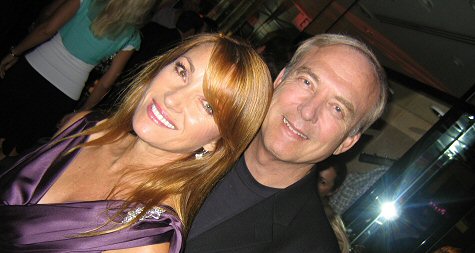
Jane Seymor and husband James Keach, producer and ground-floor instigator of Walk the Line at same after-party — Tuesday, 9.13, 9:55 pm.
I complimented Phoenix on his ultra-realistic fight scene with Mark Wahlberg in The Yards, which is one of the all-time greats. I was surprised to hear that he and Wahlberg didn’t have a stunt guy advising them, but worked out the rollin’ and tumblin’ on their own. They wore knee pads and just told each other, “Okay, I’m gonna hit you and you’re gonna fall down the stairs and then…”, etc.
Mangold, dressed in a tweed jacket and just as warm as I was, was friendly and gracious. I asked him about the film’s best scene, which he wrote, in which Sun records owner Sam Phillips tells Cash and his band during an audition that he doesn’t believe Cash’s signing of a gospel tune, and that he needs to sing some- thing tough and real, etc. Mangold agreed it’s one of the film’s best, and he toasted actor Dallas Roberts, who plays Phillips, for making the scene play as well as it does.
I also spoke to producer James Keach, who knew Cash for several years and tried, with Cash’s approval, to launch his own Cash biopic for a long while before he tied in to the Fox/Mangold/Phoenix project.
Keach and I talked about Cash’s first wife, Vivian, and how the way she’s written and the actress who plays her, Ginnifer Goodwin, makes her seem like the world’s biggest complainer and worst marital partner…a total drag.
What did they get married for? I asked Mangold. Was it sex or…? Mangold said Cash once told him he got married to Vivian because he considered her a dead ringer for Pier Angeli, who was (allegedly) the great love of James Dean’s life.
